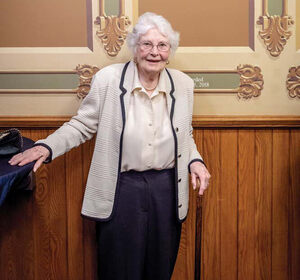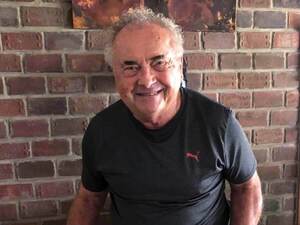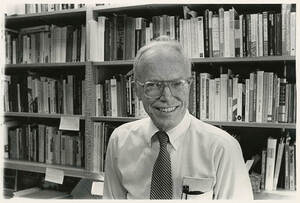
When Notre Dame became fully coeducational in the early 1970s, undergraduate women had few female role models. They soon found a valuable friend and mentor in Isabel Charles ’60M.A., ’65Ph.D.
Charles, assistant provost emerita and former director of international studies, died November 26, 2023. She was 97.
As the University’s first female dean, Charles made important contributions to the University and to the College of Arts and Letters, especially through her work to develop the liberal arts curriculum and build an academic community that empowered female scholars. She was also a key figure in the growth of study-abroad programs and worked to expand the role of women in leadership roles across campus.
Marie Isabel Charles was born in Brooklyn, New York, the eldest of seven children. She grew up in Columbus, Ohio, where she attended St. Mary of the Springs Academy and became a Dominican sister. She then taught at several Catholic schools in New York and Ohio and earned a bachelor’s degree from Manhattan College in 1956.
After graduate work in English at Notre Dame, Charles taught and served as executive vice president and academic dean at Ohio Dominican College. In 1973, she returned to Notre Dame, which became her home for the rest of her life. She joined the faculty as an associate professor of English and assistant dean in the college at a time when women made up less than 10 percent of the faculty and Notre Dame had just 830 female undergraduates, the vast majority of whom were liberal arts majors.
She departed the Dominican order in 1975 and was named dean of the College of Arts and Letters the following year. “When the search committee approached me about actually taking the job, I was quite surprised in the sense I really didn’t think that Notre Dame was quite ready for that,” she said at the time.
In 1982, Charles became assistant provost and director of international studies, a role in which she expanded the University’s international presence and reputation. She traveled to visit existing study abroad sites and created new ones in Ireland, Greece, Spain, China, Egypt, Jerusalem and Australia, among others, as the programs grew from six to 16 locations.
Charles’ primary scholarly interests were the American novelist Willa Cather and existentialism in the literature of the 19th and 20th centuries. She retired in 1995 and, in 2018, was added to the University’s Wall of Honor, which recognizes men and women “whose contributions to Notre Dame have been lasting, pervasive and profound.”
Charles is survived by three sisters and many nieces and nephews.

Albert K. Wimmer ’64M.A., ’67M.A. arrived at Notre Dame as a graduate student in political science and went on to teach German at the University for a half-century.
An associate professor emeritus of German and Russian Languages and Literature, Wimmer died January 23. He was 84.
He was born in Altötting, Germany, earned a bachelor’s degree at the University of Munich, then moved to the United States, becoming a naturalized citizen in 1970. After completing a second graduate degree in modern German literature at Notre Dame, he earned his doctorate in medieval German literature at Indiana University. He retired in 2012 after 50 years of teaching at Notre Dame.
Wimmer was an outgoing professor with a ready smile who took a strong interest in the lives of his students. One, writing in 1979 in this magazine, recalled how Wimmer as a graduate instructor 14 years earlier had ushered him efficiently through a high-stakes German exam so he could fight later that same evening in the Bengal Bouts. Wimmer’s own wide-ranging scholarship produced an Anthology of Medieval German Literature and translations into English of contemporary works by prominent German scholars.
Among Wimmer’s favorite experiences was serving as director of the University’s study-abroad program in Innsbruck, Austria, for several years in the 1970s. He also coordinated Notre Dame’s summer programs in Vienna in 2007 and 2008. He served as acting department chair in 1997-98 and was a fellow of the University’s Medieval Institute and Nanovic Institute for European Studies.
He and his wife, Susan, used to host annual Christmas parties at their home on Lake Wawasee in Syracuse, Indiana, that featured a Christmas tree lit with real candles — a holiday tradition he brought with him from his childhood in Bavaria. He was an excellent cook and a dedicated sailor, spending many days plying the waters of Lake Wawasee.
He is survived by his wife, two sons, a stepdaughter and four grandchildren.

When J. Philip Gleason ’55M.A., ’60Ph.D. was awarded Notre Dame’s Laetare Medal in 1999 — a rare honor for a member of the campus community — he accepted it on behalf of his fellow faculty members.
Gleason was a leading scholar of American Catholic history and the social and intellectual history of the United States who taught at Notre Dame for 47 years. A professor emeritus of history, he died January 17 at age 96.
A native of Wilmington, Ohio, Gleason earned a bachelor’s degree from the University of Dayton. He served in the U.S. Air Force and worked as an eighth-grade teacher before arriving at Notre Dame to begin his graduate studies in history.
Gleason joined the history department faculty in 1959 and chaired the department from 1971 to 1974. He spent his career teaching and publishing on the topics of American Catholicism and higher education, immigration, ethnicity and intellectual history. He retired in 1996.
He was the author of numerous journal articles and books, including his best-known work, Contending with Modernity: Catholic Higher Education in the 20th Century. The 1995 book provided a comprehensive study of how Catholic universities adapted to an increasingly secular society.
Gleason is best described as a “gentleman scholar,” says Kathleen Sprows Cummings ’99Ph.D., the Rev. John A. O’Brien collegiate professor of history and American studies, who met Gleason while taking her first seminar as a graduate student. In the classroom, Gleason was tough, “but he could do criticism gently and in a caring way,” she recalls. He was soft-spoken, but “you hung on his every word.”
In accepting the Laetare, which is presented annually to a Catholic “whose genius has ennobled the arts and sciences, illustrated the ideals of the Church and enriched the heritage of humanity,” Gleason wondered what had prompted the University to bestow upon him such an honor.
“But what is it that I have done? Simply what professors are supposed to do — teach classes, meet with students, direct dissertations, serve on committees, do research and try to get the results into print. For me to receive the Laetare Medal therefore signifies that what professors do is eminently worthwhile. And presumptuous though it may be, I would like to think I stand here today as the symbolic embodiment of the Notre Dame faculty during my years at this place,” he said.
Gleason was chair of the Catholic Commission on Intellectual and Cultural Affairs, an organization independent of ecclesiastical authority, from 1986 to 1988. In 2019, he received the Distinguished Scholarship Award from the American Catholic Historical Association. And among his many honors for his contributions to scholarship is that of having one presented in his name. Since 1999, the best article published by a graduate student in history has garnered its author the Philip Gleason Prize.
He is survived by Maureen, his wife of 66 years, four children and five grandchildren.